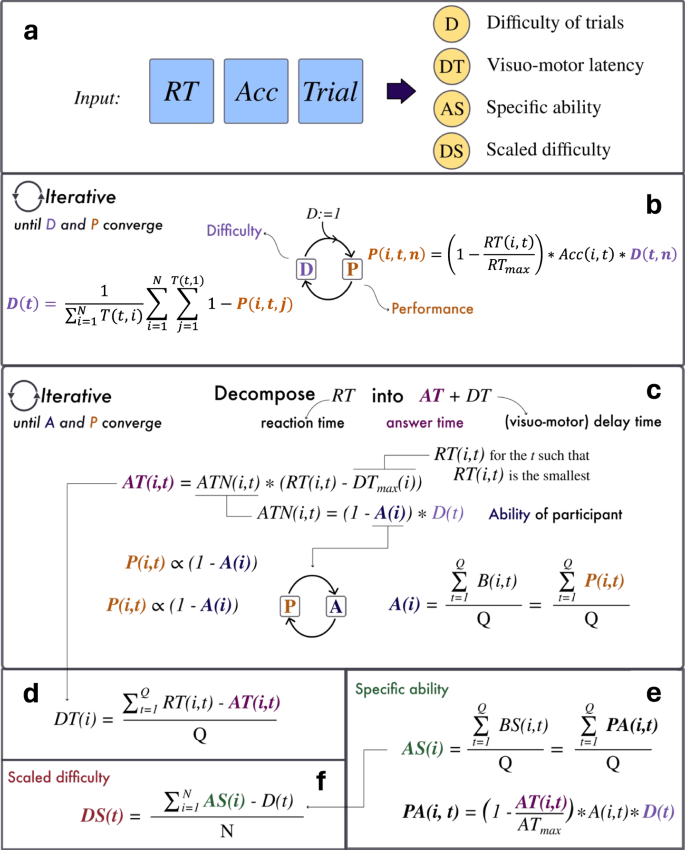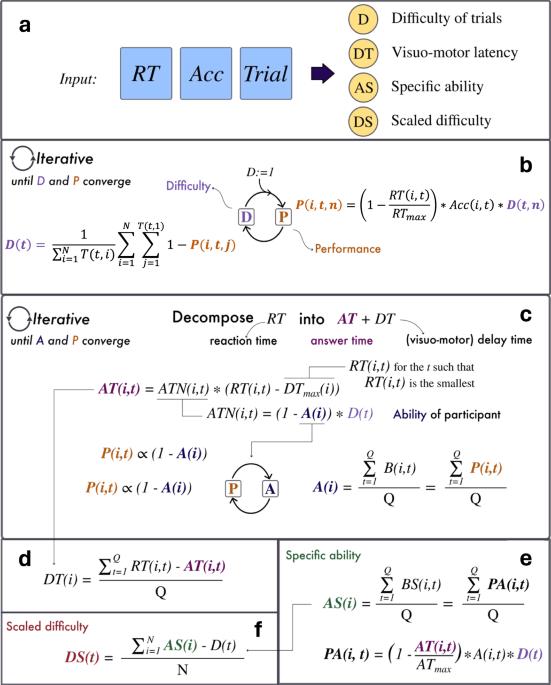从大规模在线认知数据中估算特定领域认知能力的迭代方法
IF 12.4
1区 医学
Q1 HEALTH CARE SCIENCES & SERVICES
引用次数: 0
摘要
在线认知任务作为传统监督评估的一种可扩展且具有成本效益的替代方法,正受到越来越多的关注。然而,由于人们的家用设备、视觉和运动能力存在差异,加上速度-准确性偏差,在线任务在测量认知能力方面的特异性受到了限制。为了解决这些局限性,我们开发了 IDoCT(认知任务迭代分解),这是一种以数据驱动的方式从任务表现时程中估算特定领域认知能力和试验难度等级的方法,同时考虑了设备和视觉运动潜伏期、非特定认知过程以及速度-准确性权衡。IDoCT 可用于任何认知难度在不同试验中存在差异的计算机化任务。我们利用 388,757 名成人的数据表明,IDoCT 成功地将认知能力与这些干扰因素分离开来。由此得出的认知分数显示出更强的心理测量因素分离能力、更好的跨参与者分布以及有意义的人口统计学关联。我们建议 IDoCT 可以提高在线认知评估的精确度,尤其是在大规模临床和研究应用中。本文章由计算机程序翻译,如有差异,请以英文原文为准。


An iterative approach for estimating domain-specific cognitive abilities from large scale online cognitive data
Online cognitive tasks are gaining traction as scalable and cost-effective alternatives to traditional supervised assessments. However, variability in peoples’ home devices, visual and motor abilities, and speed-accuracy biases confound the specificity with which online tasks can measure cognitive abilities. To address these limitations, we developed IDoCT (Iterative Decomposition of Cognitive Tasks), a method for estimating domain-specific cognitive abilities and trial-difficulty scales from task performance timecourses in a data-driven manner while accounting for device and visuomotor latencies, unspecific cognitive processes and speed-accuracy trade-offs. IDoCT can operate with any computerised task where cognitive difficulty varies across trials. Using data from 388,757 adults, we show that IDoCT successfully dissociates cognitive abilities from these confounding factors. The resultant cognitive scores exhibit stronger dissociation of psychometric factors, improved cross-participants distributions, and meaningful demographic’s associations. We propose that IDoCT can enhance the precision of online cognitive assessments, especially in large scale clinical and research applications.
求助全文
通过发布文献求助,成功后即可免费获取论文全文。
去求助
来源期刊

NPJ Digital Medicine
Multiple-
CiteScore
25.10
自引率
3.30%
发文量
170
审稿时长
15 weeks
期刊介绍:
npj Digital Medicine is an online open-access journal that focuses on publishing peer-reviewed research in the field of digital medicine. The journal covers various aspects of digital medicine, including the application and implementation of digital and mobile technologies in clinical settings, virtual healthcare, and the use of artificial intelligence and informatics.
The primary goal of the journal is to support innovation and the advancement of healthcare through the integration of new digital and mobile technologies. When determining if a manuscript is suitable for publication, the journal considers four important criteria: novelty, clinical relevance, scientific rigor, and digital innovation.
 求助内容:
求助内容: 应助结果提醒方式:
应助结果提醒方式:


